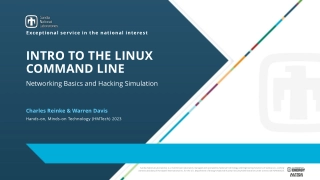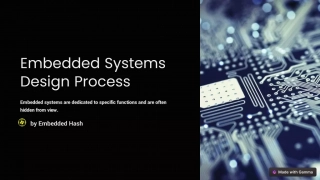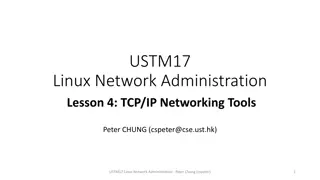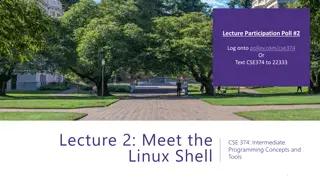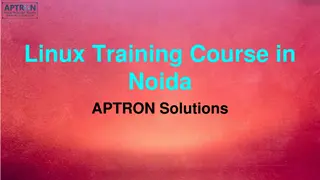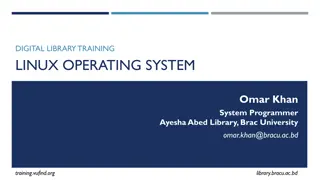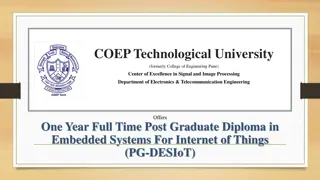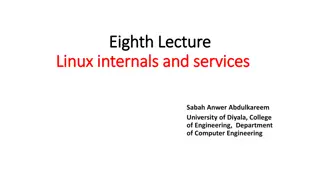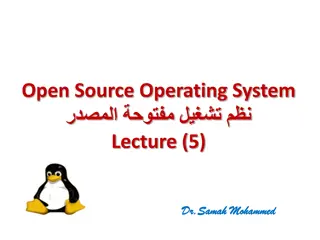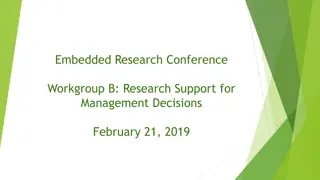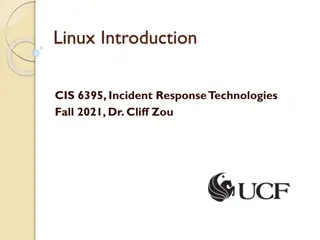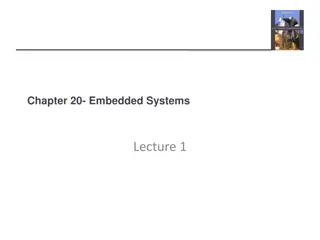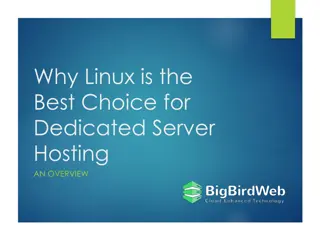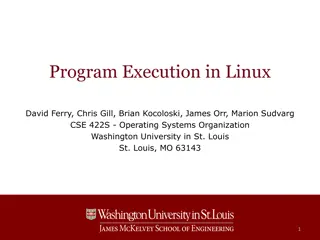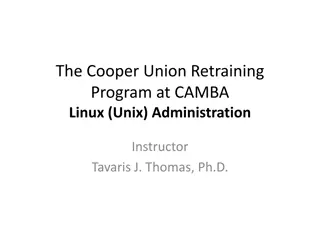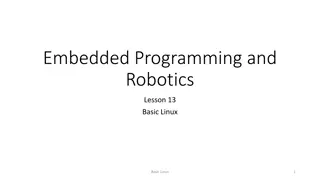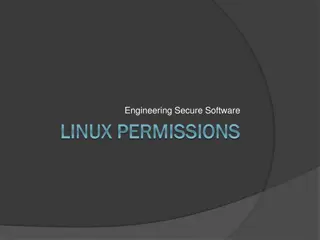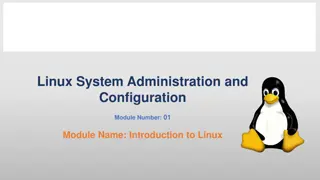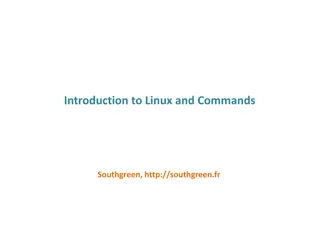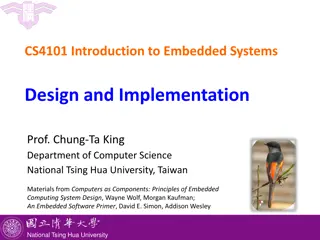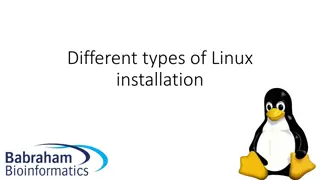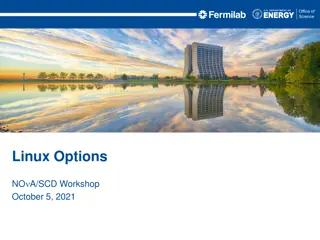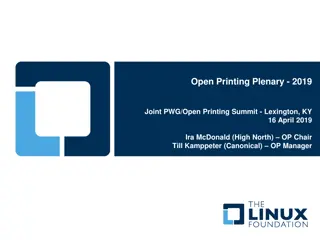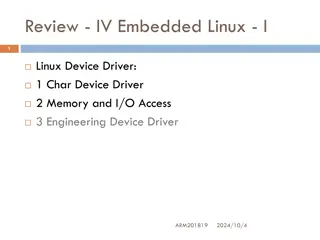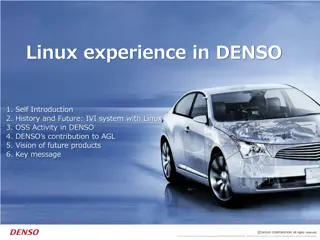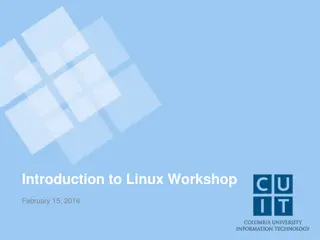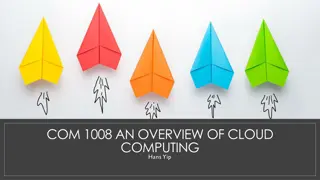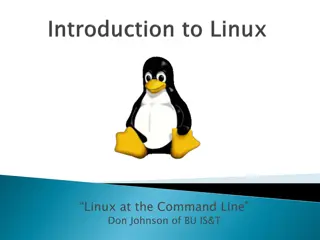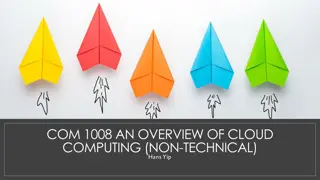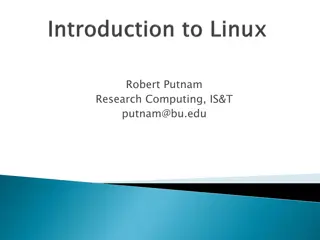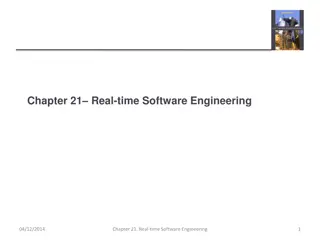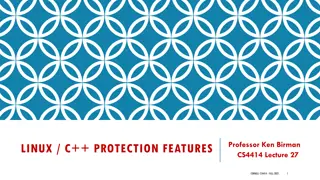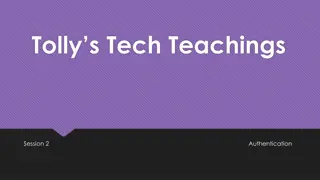Introduction to Linux Command Line
The significance of the command line interface in computing, understand why it is preferred for efficient file management, and discover Linux as an alternative operating system widely utilized on servers and supercomputers. Learn how to access a Linux server via SSH for practical application.
1 views • 14 slides
Stack Based Attacks in Linux (an intro)
Explore the world of stack-based attacks in Linux through an introductory session presented by Bryce L. Meyer at the Saint Louis Linux Users Group. Covering topics from weaknesses to exploits, shellcode, and mitigations like stack canaries and address space randomization, this overview delves into c
7 views • 60 slides
Embedded Systems Design Process in the Embedded systems
Embedded systems are all around us, from the tiny microcontrollers in our household appliances to the sophisticated control systems in cars and aeroplanes. But how are these systems designed? Let's delve into the basics of the embedded systems design process in simple terms that anyone can understan
2 views • 9 slides
Understanding TCP/IP Networking Tools in Linux Administration
The iproute2 software suite in Linux provides utilities for network control and monitoring, replacing legacy tools like ifconfig, netstat, route, and arp. This lesson delves into displaying information about network interfaces, network addresses (IP addresses), routing tables, assigned DNS servers,
2 views • 22 slides
Introduction to Linux Shell for CSE 374 Course
Explore the Linux shell basics in CSE 374 course, covering topics like using Bash shell, executing commands, connecting to remote Linux servers, and interaction basics such as navigating command history. Get ready to dive into text-based interfaces and command-line operations in a Unix environment.
0 views • 14 slides
Linux Training Course in Noida
At APTRON Solutions, we prioritize practical learning with real-world scenarios, ensuring you develop the confidence to tackle complex challenges in Linux Training Course in Noida environments. Whether you're aiming to become a Linux administrator or
2 views • 9 slides
Linux Course Overview and Content for Digital Library Training
Explore the world of Linux operating systems in the context of digital library training, covering topics such as Linux distributions, system administration, text manipulation, file systems, and network configuration. The course provides a comprehensive overview and detailed content modules to develo
1 views • 11 slides
Introduction to Embedded Systems Design
Embedded Systems Design, Chapter 1 provides an insightful overview of embedded systems, distinguishing them from general-purpose computers. The chapter delves into the characteristics of embedded systems, their design considerations, and the various types of embedded computers such as general-purpos
1 views • 7 slides
COEP Technological University Offers Post Graduate Diploma in Embedded Systems for Internet of Things
COEP Technological University, formerly known as College of Engineering Pune, is offering a one-year full-time Post Graduate Diploma in Embedded Systems for Internet of Things (PG-DESIoT). This program addresses the increasing demand for expertise in embedded systems and IoT applications. It include
0 views • 16 slides
Understanding Linux Services and Internals
Explore the components of a Linux system, including hardware controllers, the Linux kernel, operating system services, user applications, directory structure, shells, and essential Linux services. Learn how to list services in Linux by connecting via SSH and accessing them as a root user to manage c
1 views • 14 slides
Introduction to Linux Shell Scripting
Dive into the world of Linux shell scripting with a focus on the bash shell. Explore the basics of programming versus scripting, different shells available in Linux, common scripting errors, and the essential elements of writing shell scripts in Linux.
0 views • 26 slides
Embedded Research Conference Workgroup B: Management Decisions Support
Workgroup B at the Embedded Research Conference focuses on providing research support for management decisions. The participants aim to identify and prioritize operational questions that could benefit from embedded research, work productively within the existing QI ecosystem, and create an inventory
0 views • 14 slides
Introduction to Linux System Administration
Explore the essentials of Linux system administration in this course material. Learn how to access Linux servers and virtual machines, utilize SSH for secure connections, and configure Kali Linux VM settings for efficient usage. Gain hands-on experience with graphical and command-line interfaces to
0 views • 45 slides
Understanding Embedded Systems: A Comprehensive Overview
Embedded systems play a crucial role in controlling various devices and machines. They require real-time responsiveness for correct functioning, making timing analysis and architectural patterns essential. Embedded system design involves considering hardware and software interactions, system charact
1 views • 46 slides
Why Linux is the Best Choice for Dedicated Server Hosting
Why Linux is the Best Choice for Dedicated Server Hosting\nWhen it comes to dedicated server hosting, choosing the right operating system is crucial for performance, security, and scalability. Among the available options, Linux stands out as the pref
0 views • 10 slides
Understanding Program Execution in Linux
Explore the process of program execution in Linux, including details on the ELF executable file format, creating executable files, static vs. dynamic linking, and the impact of linking on executable sizes. Learn about compilation, linking, and the differences between static and dynamic linking in th
2 views • 17 slides
Linux Administration Essentials: A Comprehensive Training Program
Join the Cooper Union Retraining Program at CAMBA for an intensive course on Linux (Unix) Administration instructed by Dr. Tavaris J. Thomas. Learn core objectives spanning from file system management to network configuration without diving into hacking or programming. Explore the history of Linux,
0 views • 35 slides
Basic Linux Commands Overview for Embedded Programming and Robotics
Embedded Programming and Robotics Lesson 13 provides an introduction to basic Linux commands such as man, ls, cd, cp, and more. Understanding these commands is essential for interacting with the operating system on devices like Raspberry Pi. The lesson also covers important concepts like superuser p
0 views • 17 slides
Understanding Linux File Permissions and Security Practices
Explore how Linux file permissions work, including the concepts of read, write, and execute permissions for files and directories. Learn about changing permissions using the `chmod` command and how umask affects default permissions when creating files. Enhance your understanding of securing software
0 views • 9 slides
Overview of the Linux Boot Process
Exploring the six stages of the Linux boot process, starting from the BIOS and Master Boot Record (MBR) to the Grand Unified Bootloader (GRUB) and kernel initialization. Understand the essential components involved in booting up a Linux system, from system integrity checks to mounting the root file
0 views • 18 slides
Introduction to Linux System Administration
Explore the fundamentals of Linux system administration, including accessing Linux systems, using SSH for secure connections, setting up virtual machines, understanding the Unix system kernel and shell, and grasping the multi-user and multi-process aspects of Unix. Enhance your skills in managing Li
0 views • 42 slides
Introduction to Linux and Commands - Overview and Benefits
Linux is a powerful operating system with roots in UNIX, offering a wide array of functionalities for users. The program goals include presenting the Linux OS basics, introducing fundamental command-line operations, and showcasing the utilization of bioinformatics software. The content explores the
0 views • 79 slides
Embedded Systems Design: An Introduction to Developing Smart Devices
Delve into the world of embedded systems design with a focus on creating smart devices that enhance everyday objects. Understand the importance of embedded systems, explore typical design flows, and learn how to define requirements for developing efficient and functional products. Start your journey
0 views • 19 slides
Introduction to Linux: Course Overview and Objectives
This introduction to Linux course provides a comprehensive overview of operating systems, including the history, variations, user interface, and essential commands. The course is designed with lectures, labs, and exercises to help participants gain a better understanding of Linux and its practical a
0 views • 77 slides
Energy-Efficient Query Processing on Embedded CPU-GPU Architectures
This study explores the energy efficiency of query processing on embedded CPU-GPU architectures, focusing on the utilization of embedded GPUs and the potential for co-processing with CPUs. The research evaluates the performance and power consumption of different processing approaches, considering th
0 views • 22 slides
Different Types of Linux Installation Methods
This detailed guide covers various methods for installing Linux, including on bare metal/physical hardware, through CD/DVD/USB/network, in a virtual machine, and on cloud services like Amazon EC2. It explains the differences between live image installations and guided installations, as well as provi
0 views • 12 slides
Evaluation of Linux Distribution Options by CERN and Fermilab
CERN and Fermilab are evaluating Linux distribution options and have decided to target CentOS Stream 8 as the standard distribution for experiments. Red Hat has proposed an academic licensing scheme, but concerns exist about its applicability. CentOS Stream 8 is considered low risk and has been runn
0 views • 6 slides
Linux Printing Technologies Overview
Delve into the world of Linux printing with insights on open printing plenary sessions, Linux distribution market shares, driverless printing support, CUPS filters development, and future trends. Explore the growing popularity of Linux in various sectors and witness the advancements in driverless pr
0 views • 13 slides
Understanding Embedded Linux Device Drivers for ARM Architecture
Explore the intricate world of Linux device drivers with a focus on ARM architecture. Delve into topics like character device drivers, memory and I/O access, block device drivers, and various other driver types. Gain insights into the principles and workings of LCD drivers, IIC drivers, network driv
0 views • 123 slides
Understanding Embedded Systems and Cyber-Physical Systems
Embedded systems are specialized computer systems embedded within larger systems, such as control systems and car controllers. This lecture covers real-time aspects, applications of Cyber-Physical Systems (CPS), and examples like the Boeing 777/Airbus A380 cockpit. It discusses the design process of
0 views • 22 slides
In-Vehicle Infotainment System Evolution at DENSO: A Linux Experience
Explore Kazuo Tsubouchi's journey at DENSO, from software engineer to General Manager of ICT Division, focusing on Linux-based IVI systems. Witness DENSO's transition to Linux in car navigation, joining Linux Foundation and GENIVI, contributing to AGL, and shaping the future of in-vehicle technology
0 views • 20 slides
Introduction to Linux Workshop and History: A Brief Overview
Delve into the world of Linux with an introduction to its basics, operating system functionalities, and a quick history lesson from the Unix roots to the release of Linux. Explore the significance of Linux as an operating system and the evolution of computing. Get insights into key milestones like U
0 views • 98 slides
Overview of Windows Subsystem for Linux 2 (WSL2)
Windows Subsystem for Linux 2 (WSL2) is a new feature in Windows 10 that enables users, especially developers, to run native Linux command-line tools directly on Windows alongside traditional desktop applications. WSL provides a way to use Bash, common Linux tools, and Linux-first tools on Windows,
0 views • 11 slides
Introduction to Linux: Key Aspects and Application in Robotics
Discover the significance of Linux in the world of robotics and beyond. Learn about its widespread usage, versatility under the GNU GPL license, robust security features, and practical application through executing bash scripts on a Linux system. Dive into the fundamentals of Linux Shell interaction
0 views • 21 slides
Introduction to Linux at the Command Line with Don Johnson
Dive into the world of Linux with Don Johnson from BU IS&T. Learn about Linux's origins, common OS used by researchers, GNU utilities, essential commands, file systems, network tools, and more. Discover the importance of xterm emulation software and Mac OS X Terminal in this comprehensive guide to m
0 views • 30 slides
Overview of Windows Subsystem for Linux 2 (WSL)
Windows Subsystem for Linux 2 (WSL) is a new feature in Windows 10 that allows users to run native Linux command-line tools directly on Windows alongside traditional desktop and store apps. It is primarily geared towards developers, especially web developers and those working with open-source projec
0 views • 14 slides
Understanding Linux and Its Importance in Computing
Linux, a Unix clone developed by Linus Torvalds in 1991, is a widely used operating system powering servers, mobile phones, and other devices. It emphasizes the collaborative nature of software development and the synergies between different programs. This overview delves into key aspects of Linux,
0 views • 49 slides
Understanding Real-time Software Engineering for Embedded Systems
Embedded systems play a crucial role in controlling various machines and processes. Real-time software engineering focuses on designing systems that respond instantly to events, ensuring correctness and timeliness. Characteristics like continuous operation, unpredictable environment interactions, an
0 views • 59 slides
Enhancing Cybersecurity in Modern Linux Systems
Explore the evolving landscape of cybersecurity in Linux systems as discussed in Professor Ken Birman's CS4414 lecture series at Cornell University. The focus is on protection features, defense strategies, code reviews, and continuous efforts to secure Linux platforms against exploits and vulnerabil
0 views • 55 slides
Understanding Authentication in Networking Environments
Authentication is a crucial process in computer networks where clients prove their identity to servers. This article covers the concept of authentication, its importance, and specific guidance on network authentication, particularly focusing on Windows and Linux VMs. Key topics include the use of pa
0 views • 30 slides
